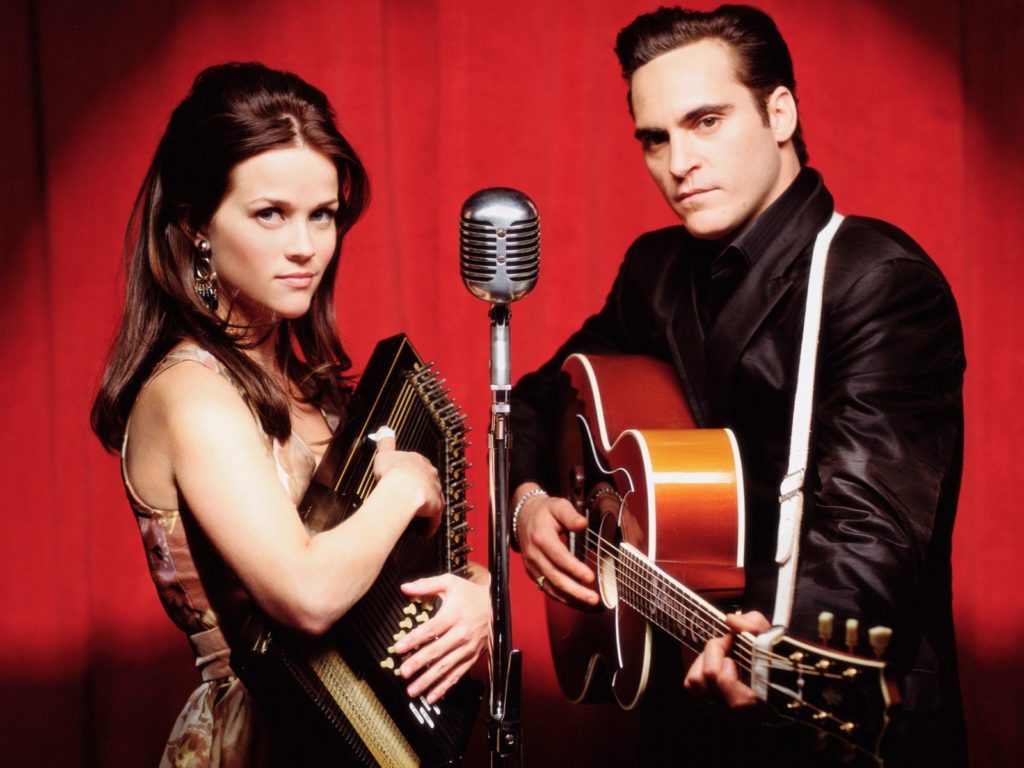Walk the Line (2005)

Inevitable comparisons to the previous musical biopic, Ray, are almost a given, especially since both films cover similar ground. Both films are about the early careers of legendary songwriters and performers with tragic pasts, drug problems, marital infidelities, and constant career crossroads. However, despite the familiar story here, Walk the Line does emerge as the better picture, mostly because it does manage to give us a better understanding as to the man behind the music, and what drove him to write the types of songs that he does.
For those that don’t already know it, Walk the Line is a biography of Johnny Cash’s days as a youth and young man, growing up poor but with a love of music fostered by his mother, while his father never seemed to think much of him as a son. Johnny would get away by joining the Air Force, but it didn’t heal the emptiness that was inside him, so he put his effort into the music that comforted him so much, which eventually led to him landing a recording contract for his mix of country and western with rock-and-roll sensibilities. Cash would be an instant success as a performer but left a lot to be desired as a family man, and as much as he tried to hold up both fronts of his life, eventually they both came crashing down. All would seem lost if not for fellow tour performer June Carter, a divorced singer/comedienne that saw the good in Johnny even when he had trouble seeing it himself.
Stellar performances bolster this biopic into becoming one of the year’s best films. Joaquin Phoenix, while not exactly a dead ringer for Johnny Cash, does nail down his mannerisms and singing style well enough that you can readily accept him in the role, and he does an exceptionally fine job in the dramatic moments that are crucial to making what might otherwise look like a self-centered S.O.B. into a sympathetically troubled soul yearning for guidance his whole life and never quite able to find it until it appears in the guise of another woman. As solid as Phoenix is, Reese Witherspoon often threatens to steal the film outright with perhaps the strongest role of her career as the sassy and resolved June.
Although the on-again, off-again romance between Johnny and June would seem like an unlikely subject to hinge the entire biography of Johnny Cash on, credit writer-director Mangold for making it work, as it draws out who the man truly is in a way that no other angle seems satisfying enough to do. When most people think of Johnny Cash, they think of a gruff man dressed in black that sang about prison life and hard knocks, but after seeing the film, he s transformed into a man of great passion, both for music and for his woman.
With commanding performances by the two leads, solid musical numbers that set the tone for the real-life drama well, and Mangold’s excellent ability to keep focus on what’s really important, Walk the Line becomes a film that nearly all viewers will be able to relate to and enjoy, and not just fans of Johnny Cash and his music. While Cash’s music is more of an acquired taste, even for country fans, there’s no doubt that newfound respect for the man and his music will accompany the sure accolades the films will receive come award season. Well-delivered music, great actors, and a touching romance all add up to making Walk the Line a film that does the Cash legacy a world of honor.
Qwipster’s rating: A+
MPAA Rated: PG-13 for language, drug use, and sensuality
Running Time: 136 min.
Cast: Joaquin Phoenix, Reese Witherspoon, Ginnifer Goodwin, Robert Patrick, Dallas Roberts, Dan John Miller, Larry Bagby, Shelby Lynne, Waylon Malloy Payne, Tyler Hilton, James Keach
Director: James Mangold
Screenplay: Gill Dennis, James Mangold
